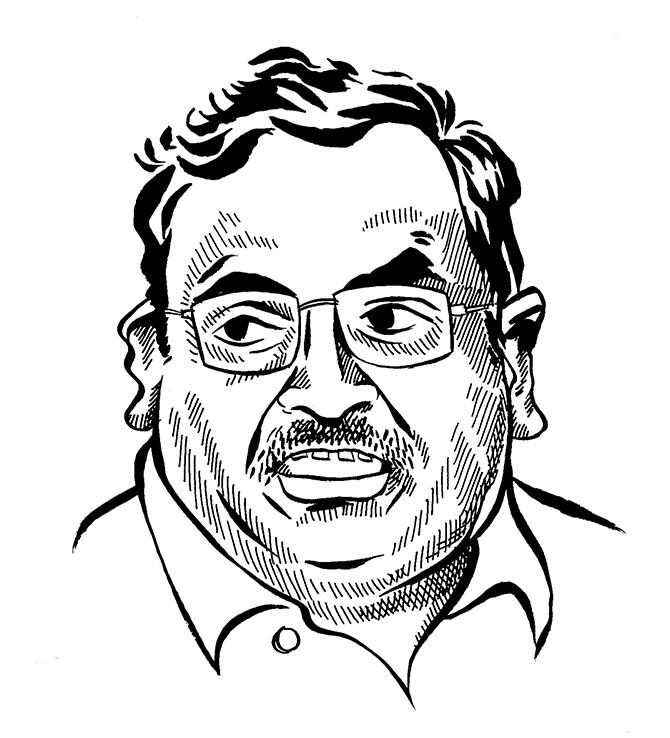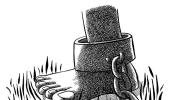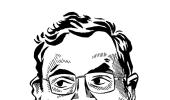'Every report I filed for Rediff.com on the professor's incarceration, would leave me wondering for days, at the depth of the State's malevolence towards this disabled professor, and his equally deep capacity to tolerate it,' recalls Jyoti Punwani.'
'No country in the world would do what our country was doing to someone so helpless.'

When I refused to die
my chains were loosened
I came out
Into the vast meadows
Smiling at the leaves of grass
My smile caused intolerance in them
I was shackled again
Again, when I refused to die
tired of my life
my captors released me
I walked out
into the lush green valleys under the rising sun
smiling at the tossing blades of grass
Infuriated by my undying smile
They captured me again
I still stubbornly refuse to die
The sad thing is that
They don't know how to make me die
Because I love so much
The sounds of growing grass
November 2017. (Remembering October 1917)
G N Saibaba, life convict, Anda Cell, Nagpur Jail
Alas! Though Professor G N Saibaba died a free man, acquitted of all charges, he could not savour the sounds of freedom for even a year.
This was the man who, by sheer will power, had ensured that his body, 90% handicapped, survived three stretches of incarceration amounting to eight-and-a-half years, in Nagpur's Central Jail, deprived of the wheelchair he was dependent on since childhood, deprived of the medicines he needed for his 19 ailments; deprived of the bland diet most appropriate for him, deprived of medical treatment.
When he was arrested the second time, in December 2015, on orders of the Gadchiroli sessions court, Professor Saibaba was due for pancreatic surgery. A delay would lead to infection, his doctors had warned.
On Saturday, October 12, 2024, the 54-year-old professor died of complications following gall bladder surgery at one of Hyderabad's best hospitals.
What fate determined that the frail being who survived the harsh winters and intense summers of Nagpur, confined to the Anda Cell, would not survive more than seven months of freedom?
'I am living like an animal taking its last breaths,' he had written to his wife A S Vasantha Kumari, from prison in November 2017. This was eight months after having been convicted for life under the anti-terrorist act UAPA on charges of being a Maoist by a sessions court.
As Nagpur's chill set in, and shooting pains wracked his broken body, the jail authorities refused to allow him the warm clothes sent by his family.
Such refusals continued till the very end. In December 2020, frustrated after repeated failures at providing him essentials (shampoo, napkins, a woolen cap, a t shirt), his lawyer wrote an open letter to the jail authorities, saying he was giving up, Saibaba's fate was now their responsibility.

As if they cared! Professor Saibaba had to go on repeated hunger strikes for his demands; only when they could ignore him no longer would they listen.
Typically for the man who was jailed only for speaking up for the voiceless, his hunger strikes resulted in improving the quality of life for all prisoners. Small but vital changes ensued, like increase in phone calls during the Covid lockdown; an end to arbitrary delays in the despatch and receipt of letters to and from home, the lifeline of any prisoner.
Every report I filed for Rediff.com on the professor's incarceration, would leave me wondering for days, at the depth of the State's malevolence towards this disabled professor, and his equally deep capacity to tolerate it. No country in the world would do what our country was doing to someone so helpless, I used to think.
Someone who had been paralysed waist downwards after childhood polio and been taught to manage himself by his mother from the age of 5, was refused parole to visit her or even video call her as she lay dying, and then to see her body.
'Mother, lose not your hope,' Professor Saibaba had written after his mother's last meeting with him in jail after his 2017 conviction.
'I realised that jail is not death
it is my rebirth
and I will return home
to your lap that nurtured me
with hope and courage.'
The State made sure that promise could not be fulfilled.
Someone dependent on others for his daily functioning, was not provided attendants. During the Covid lockdown, the Supreme Court ordered that prisoners be let out to avoid infection. Professor Saibaba was not, and went on to contract Covid in jail twice. His family was denied access to his medical records.
Even a visit to the jail by a judge didn't help improve things. As Vasantha put it, "Why are they so afraid of someone who is 90% disabled?"

The answer lay in the words of Pradeep Mandhyan, the lawyer whose arguments resulted first in his discharge in 2022, and then in his acquittal on March 5 this year. "A fearless man devoted to truth, fairness and justice; a paraplegic with a brain feared by criminals."
It was that brain that could write the poem quoted above, even as he lay "like an animal, taking its last breaths." Both -- the letter to his wife describing his condition, and the poem recalling with hope the Russian Revolution of October 1917 -- were written from jail in November 2017.
It was that brain that refused to give in. The day he was first picked up in May 2014 by the Maharashtra police, he was told he'd be let off if he agreed to sign as per their instructions, an offer made again later, according to Vasantha. Professor Saibaba refused.
The day he was let off in March 2024, instead of playing safe and rushing home, he addressed a press conference in Nagpur.
It was therefore just in character that he asserted, both when out on bail in 2016 and then after his release this year, that he had no regrets for the human rights activism that had landed him in jail.
Speaking out against Operation Green Hunt, launched jointly in 2009 by the Congress-led UPA government at the Centre and the BJP government of Chhattisgarh, to clear the way for the takeover of tribal land by corporates, was something he had to do. "How can we be silent when we see millions of Adivasis being displaced? Do we have a choice whether to speak or not?" he'd asked.

But Professor Saibaba wasn't defined only by his unwavering commitment to human rights. He was defined also by his love for teaching. He taught his fellow inmates English, and enjoyed seeing their minds bloom. He longed to go back to his teaching job. Love of literature defined him too, as did love of life itself.
The blame for this Renaissance Man's untimely death lies, of course, on his prolonged and unjust incarceration under sub-human conditions, for which both our national parties are responsible. But it also lies on the judiciary, from the sessions judge who convicted him despite no evidence; to the many judges who denied him parole and bail, seeing only the charges against him, not his frailty; to the Supreme Court which convened urgently to stay his discharge and refused to release him.
Judge Suryakant Shinde. who convicted Professor Saibaba, expressed regret in his judgment that though a life sentence wasn't 'sufficient punishment' for him, the court's hands were tied. Taking that judgment apart line by line, Advocate Mandhyan argued in court that it was not the accused who had conspired, it was the other side that had entered into a conspiracy against the accused.
Now the man the Establishment feared is no more. "Prisoners must be treated as human beings, not as animals. Doing that is harmful not just for the prisoner, but even for society," Professor Saibaba told me after his release.
Indeed, we in the world's largest democracy, have been dealt a terrible blow with the untimely death of an intellectual any country would have been proud of.
Feature Presentation: Aslam Hunani/Rediff.com











